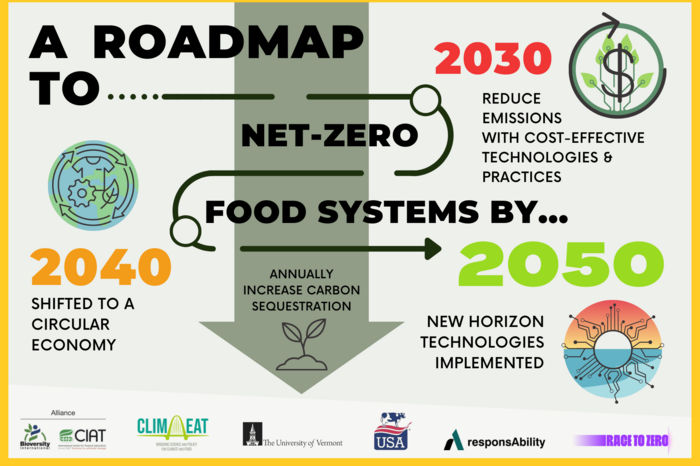Envisioning net-zero food systems
A new assessment of over 60 scenarios based on current low-emission practices shows that realizing net-zero food systems will require widescale adoption of new technologies in the next two decades and changes in meat and dairy consumption. A more diverse set of practices and innovative research, including diet shifts and new-horizon technologies, will be needed for this transformation.

While net-zero food systems by 2050 are achievable, we must boldly implement more efficient production practices fundamental to meet global food production and climate goals now.
Ciniro Costa Jr., Eva Wollenberg, Mauricio Benitez, Richard Newman, Nick Gardner & Federico Bellone
Food systems emit approximately 35% of global greenhouse gas (GHG) emissions. As the global population is expected to grow to 9 billion by 2050, food demand will increase rapidly, and agriculture production must follow.
“Transforming food systems for net-zero is essential for the whole Paris Agreement equation to work and deliver on the need to limit the temperature increase to 1.5˚ C above pre-industrial levels by 2050, with important benefits for the resilience of millions of people around the world" – Federico Bellone, Co-author, UN High Level Climate Champions & Race to Zero
However, there are no silver bullet solutions that work across local, regional and global scales. Local and regional food system intensification must identify locally relevant strategies to meet socio-economic and environmental targets.
“While net-zero food systems are achievable, bolder implementation of more efficient production practices is fundamental to meet both global food production and climate goals.” – Ciniro Costa Jr., Lead Author, Alliance of Bioversity International & CIAT
To achieve net-zero, the global food system must implement cost-effective mitigation practices and technologies by 2030 and improve country governance and technical assistance by 2040. By 2050, implement innovative financial mechanisms and affordable technologies to achieve a net-zero emission global food system.
This roadmap presents milestones; we cannot wait to start changing consumption patterns and developing new technologies. We must start now.
Most read news
Organizations
Other news from the department business & finance

Get the food & beverage industry in your inbox
By submitting this form you agree that LUMITOS AG will send you the newsletter(s) selected above by email. Your data will not be passed on to third parties. Your data will be stored and processed in accordance with our data protection regulations. LUMITOS may contact you by email for the purpose of advertising or market and opinion surveys. You can revoke your consent at any time without giving reasons to LUMITOS AG, Ernst-Augustin-Str. 2, 12489 Berlin, Germany or by e-mail at revoke@lumitos.com with effect for the future. In addition, each email contains a link to unsubscribe from the corresponding newsletter.




























































